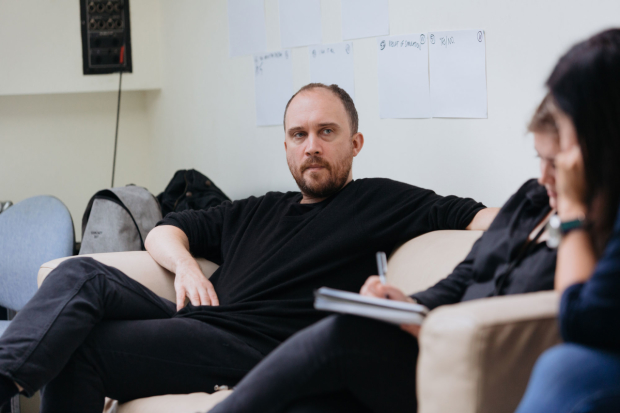Chris Thorpe: 'Would I describe Victory Condition as a play? I don't care'
Theatremaker and playwright Chris Thorpe talks about his new Royal Court play which focuses on the human need to win

© Helen Murray
During our interview, Chris Thorpe and I sit in a small Royal Court dressing room together. The last time I was as close up to the playwright and maverick theatre maker, he was violently stamping on a mobile phone (not mine) right in front of me.
No he doesn’t, to my knowledge, have anger issues. I was in fact watching his and Hannah Jane Walker’s piece I Wish I Was Lonely which involved the entire audience leaving their phones on, putting them into the centre of the space and letting Thorpe and Walker use them in the show. At one point Thorpe stamps on a 'fake' phone, but on one of the shows it all went a bit wrong. "I hadn’t quite worked out how to tell which was the fake phone if there was another one just like it in the mix. I had a 50/50 choice and I made the wrong choice," he tells me.
Luckily for him, the mobile wasn’t exactly an iPhone X and it was easily replaced. In fact, says Thorpe, he still knows the woman whose phone he smashed: he bought her a slightly nicer version to replace it. This amenable, audience interactive, close to the performers approach is all over Thorpe’s work. In Confirmation, a co-production with The TEAM’s Rachel Chavkin, he superbly investigated something called confirmation bias – the way most of us fit facts into our already existing belief system, thereby interpreting events according to our preconceptions. In it we witnessed Thorpe right at the heart of the scenario, as he tested his own political beliefs by getting to know a white supremacist, and several other political extremists. During that show, the audience were involved – they were asked to read out sections of the script and verbatim moments from interviews. In The Oh F**k Moment – another collaboration with Walker – the audience sat round a table and were encouraged to reveal examples of moments where they messed up. Thorpe’s work is, more often than not, personal, intimate and difficult to look away from.
'The main thing my uni drama course showed me was that this isn’t a path it’s a series of mistakes'
For his latest piece, he’s stepped behind the scenes – something he’s also done fairly regularly – to write a piece called Victory Condition, commissioned and directed by Vicky Featherstone for the main stage at the Royal Court. It’s a slight departure for Thorpe, who recognises that this theatre is seen in a particular cultural space, which hasn’t always been associated with the kind of live art, theatre crossover he is often part of. Although he isn’t a stranger to that specific stage, having performed a six-hour piece on it, as part of LIFT.
And Victory Condition already feels like a bit of a slippery beast. I put it to him that from the marketing spiel, it sounds as though the piece may have echoes of Confirmation, in the way it uses a real human theory as its basis. But Thorpe says that isn’t quite the case.

© Helen Murray
"It’s not driven by an investigation of a single cognitive theory," he says, "But I suppose there is a conceptual thing behind the title which I really like." A victory condition is something computer games nerds will probably be familiar with. It’s essentially the idea that there are certain actions in a game which lead to you winning (or losing).
"I find that fascinating," says Thorpe, "Because that need to win or that need for an ending is something we have within us, inherently. Which is a little like confirmation bias."
The thing is, says Thorpe, us all being conditioned for victory has helped develop the world in which we now live, "the structures [it has created] are things that are killing us, they are narrowing us. We now have a world that feeds in to the most negative part of the need to win."
Everything Thorpe says about the piece sounds intriguing, but he won’t be drawn on much more detail than elaborating a little on what a victory condition is. It sounds as though the piece plays with form, but he’s careful not to reveal too much. "The structure of the experience of the play is that there are multiple things going on at once. There is a disjunction between the things that you see done and the things that are being said," says Thorpe. Would you even describe it as a play? I say, "I don’t care," he shrugs. "There are very specific things that happen, the information that they carry is really important, the images that they carry are really important, the language that this play uses and the way it's performed are all really carefully crafted, first by me and then everyone else involved."
Thorpe took drama by accident. It was a clerical error
Speaking to Thorpe, it's refreshing how keen to talk he is. How open and excited he is about the prospect of debate. There's absolutely nothing remote about him, he's there, in the room, enjoying human company and conversation. He's thoughtful with his answers, but clearly likes an off-the-cuff phrase. That and a lot of swear words. For someone who is in the world of creating theatre, there's something very straight-down-the-line about him.
That may come from the fact that Thorpe came to drama by accident – a clerical error, he says – and found himself in an interview "making the answers up" in an effort to convince a lecturer at Leeds University to let him on the course. He ended up on the theatre studies course, although he had originally imagined himself as a scientist. He sees himself now as lucky.
"I got on this course where we were thrown into an old church and told to make mistakes," he says, "The main thing it showed me was that this isn’t a path it’s a series of mistakes. If you carry that with you for the rest of your life, as long as you put the work in then it’s kind of impossible to f**k it up."
It’s an admirable approach, and one which has clearly helped grow Thorpe’s ability to make dynamic, heart-stopping, enthralling and relevant work. Clearly, being able to fail, and fail better, is the key to everything. And, take it from me, whichever side Chris Thorpe is on – either winning or losing – is probably going to be having the most fun.
Victory Condition runs at the Royal Court from 6 to 21 October. Thorpe's production of Beowulf runs at the Unicorn Theatre until 5 November.















